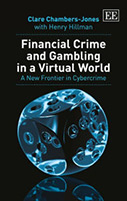Financial Crime and Gambling in a Virtual World: A New Frontier in Cybercrime

Authors: Clare Chambers-Jones and Henry Hillman
Publisher: Cheltenham, UK; Northampton, MA: Edward Elgar, 2014. 208p.
Reviewer: Graham Brooks | July 2015
This is an informative book that is presented in a thoughtful and logical way and is written in an accessible style. As such it is useful to those unfamiliar with cybercrime, and explains in clear unambiguous language all concepts, ideas and legal frameworks, rather than burying them deeply in impenetrable technical jargon. This is commendable, as the authors have avoided the flaw in some academic books which often assume we all have a set level of understanding of the language of a specific discipline. This book therefore is of use both as an academic and practical text, and should reach a wide audience. In this sense, the book might be used as a key or supplementary text, depending on the discipline and course, as its subject cuts across disciplines, and should attract interest from academics as well as law enforcement bodies.
The aim of the book is clearly stated in the introduction, as are the issues that it intends to debate. Chambers-Jones and Hillman are balanced in their approach, critical where necessary of previous academic work, and likewise of legal frameworks, legislation and national and international law enforcement cooperation if called for. Most of all, they highlight the paucity of understanding regarding crimes in the virtual world, and the need for research into the array of these virtual worlds. They further request in a passionate way that we consider the impacts of criminal acts in the Internet and virtual world, and the harm this can and does cause in the actual physical world.
The book further highlights the seriousness of these issues and produces a compelling case that the regulation of gambling, in particular, in the virtual world is in need of attention. The authors propose some solutions and recommendations that are realistic and potentially achievable, depending on the degree of political and law enforcement knowledge and understanding, and most of all the willingness to tackle what is a current and increasingly serious matter. This comes across as an appeal to consider the impact the virtual world has on the physical world, and as an explanation and justification that law enforcement must be provided with the best available tools to regulate these particular media. There is no sensational, dramatic language here, but rather a thoughtful and meaningful discussion on a subject matter that needs further international debate and discussion above and beyond ‘sound-bite’ legislation. As indicated, the book amply highlights the need for a systematic review of gambling in a virtual world. Whilst the authors presumably did not set out to suggest this, in reading this book it is impossible not to be concerned about the limits of present attempts to regulate the virtual world and the potential avenues for criminal behaviour and exploitation.
A leitmotiv in the book is that the law has failed to evolve and keep pace with the changing face of cybercrime. This is not in doubt, and Chambers-Jones and Hillman, whilst pointing out the current flaws in regulating the virtual world come across as sympathetic to those tasked with this policing. Without an increase in law enforcement resources, those tasked with preventing virtual abuses that reach into the real world will always be ‘behind the curve’ in countering criminal acts and harms. As these authors state, we should consider the Internet as a shared public environment, and that ‘fantasy crime’ ( a misleading term) in the virtual world will cause real harm to somebody in the physical world.
Among the few criticisms I have of the book is that its methodology and the justification for the research sample, while described, needed a little more attention. But in summary, this is an interesting and informative book, and one that helps fill a gap in the market. There are certainly issues that need further attention, but I realise that it is impossible to discuss every issue in depth in one book.
Prof Graham Brooks, University of Wolverhampton, Faculty of Social Sciences


